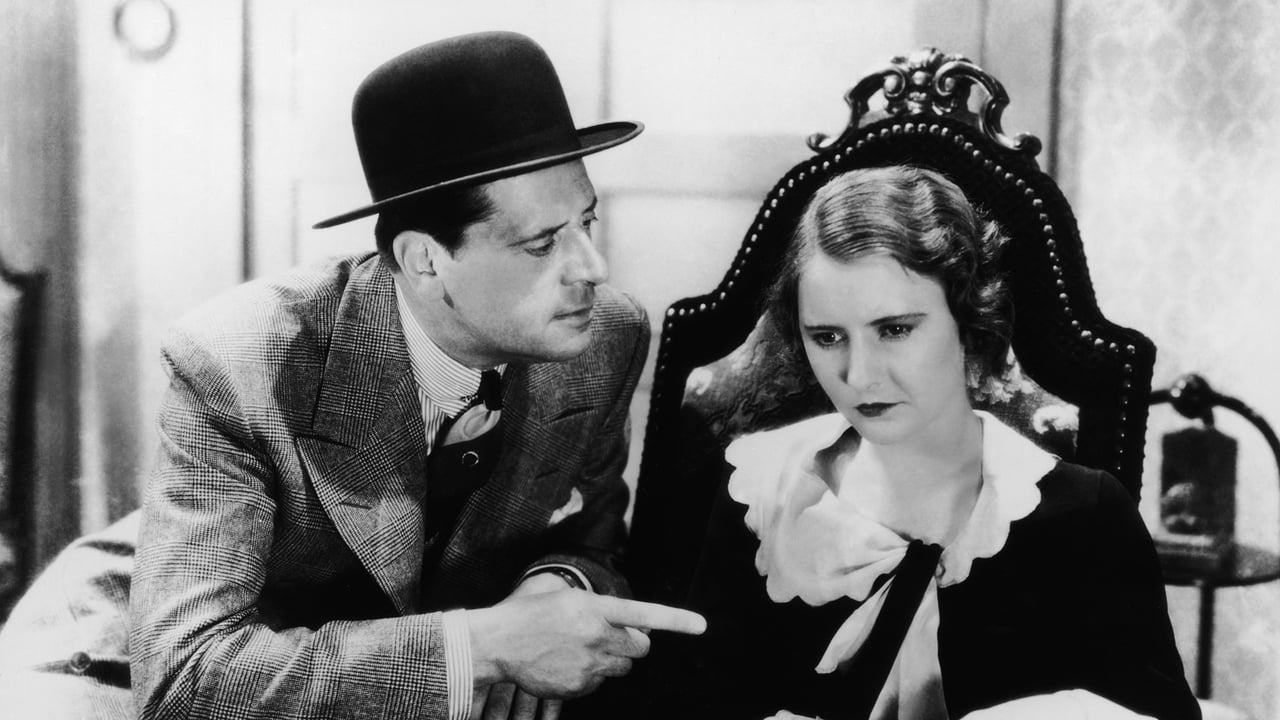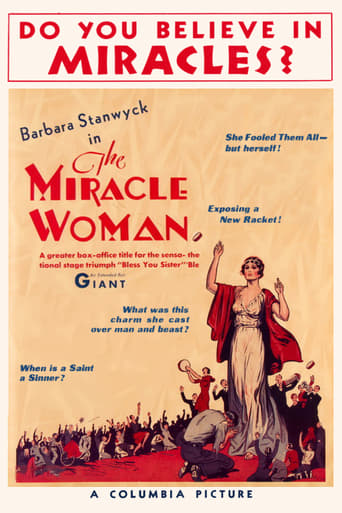

Florence Fallon (Barbara Stanwyck) loses her preacher father and takes to the pulpit to denounce his uncaring flock for not appreciating his goodness. She takes her bitter rants to the radio and becomes a highly successful evangelist with greedy promoter Bob Hornsby. John Carson is a blind struggling songwriter taken with Florence's sermons. His faith in her restores her faith in humanity.Frank Capra and Stanwyck bring a nice tale of redemption and salvation. This is Capra a little bit before his biggest hits. It certainly has his movie belief in humanity and goodness. Stanwyck has her usual acting power. John Carson should be less well off and leave that dummy out of this please. He needs to work with orphans or heal the sick which could inspire her. Stanwyck and the Capraism mostly work which is very good. This is like an early flawed prototype for Capra's later icons.
... View MoreThis isn't bad, a kind of re-telling of the story of Amee Semple McPherson and her Four Square Gospel, a popular religious movement during the 20s. She'd be a television celebrity today. McPherson, I think, disappeared mysteriously and some time later showed up without any adequate explanation for her absence. It was widely thought that she'd been shacked up with a married boyfriend someplace, maybe on the Monterey Peninsula. Charges were brought. The scandal that followed was scandalous.Barbara Stanwyck plays a similar character in this early 30s production. Her religious beliefs are genuine and intense, and she empties a church while defending her father's integrity, shouting that the congregation is hypocritical. A perfectly pragmatic bad guy, Hardy, latches onto Stanwyck's emotional impact and talks her into organizing a kind of religious traveling circus, complete with shills in the audience and phony faith cures. His argument is simplicity itself, a spun-out version of Kant's hypothetical imperative. Sure, we're all hypocrites. So why not be a hypocrite that makes money out of that hypocrisy? Still bitter, she agrees, and the show is a great success. Enter David Manners, a blind ex aviator from World War I. (Kids: that was 1917-1918.) Distraught and hopeless, he's about to jump out of a window when he hears one of her radio broadcasts and undergoes some kind of Road-to-Damascus number.They meet. They fall in love. Everything looks rosy except that Stanwyck is now beginning to feel some guilt over her phoniness. She wants out of it but Hardy has arranged things in such a way that she's trapped in her role as fake preacher. There's humiliation, disgrace. But the director, honing his skills for such later successes as "It's A Wonderful Life" and "Mister Smith Goes to Washington", let's everybody off easy.I've never found Barbara Stanwyck as compelling an actress as some others have but she puts a lot into this role. She looks vulnerable. She would hit a neat peak in her career with "Double Indemnity", partly because of that tight sweater, that golden anklet, and that outlandish blond wig. She should have probably retired earlier than she did because the image she left with too many people is that of the hard-faced dominatrix of some revoltingly rich family of ranchers.But the script isn't bad. The blind pilot is something of a bore, but Sam Hardy as the corrupt manager has an admirably complex role and does well by it. Too bad the movie has lost so much of its historical resonance. Who remembers Aimee Semple McPherson today? Everyone did in 1931.
... View MoreIn the scene of the fire ladder-truck racing to the scene, the city streets were actually filmed at night.Clearly seen on the left side of the street, the fire truck passes: "The Owl Drug Co." That company had a related past of selling highly suspect "cures" in the 1920-30's when this film was made.Also newspaper articles at the time noted that they had a hand in controlling the prices of drugs sold. The view of the building, brightly lit up at night, does not seem to be completely accidental. Other city streets could have been used.I wonder if the sight was intentionally included by the director/cameraman as a comment relating to "Sister's" "cures". You can read about the The Owl Drug Co. by searching for it on the Internet.
... View MoreClearheaded, consistently entertaining indictment of shear-the-sheep religion, from an unsuccessful Broadway play that starred Alice Brady, this quick-moving melodrama benefits from a terse Robert Riskin screenplay where every line counts, atmospheric Joseph Walker photography, and some very fine acting. Capra, as usual, makes his points quickly, finds humor where there's humor to be found (note the drunken party greeter repeatedly falling out of his chair), and gives even the minor characters distinctive personalities. Best of all is a blazing Barbara Stanwyck, who has a stunning first scene and doesn't let up from there, and the camera loves her. As the blind vet who adores her, David Manners plays blind very well, is un-self-consciously handsome, and minimizes the annoyingly angelic aspects of his character. It's over in an hour and a half, meaning it makes the same points as "Elmer Gantry" in about half the time, right down to the similar finale.
... View More